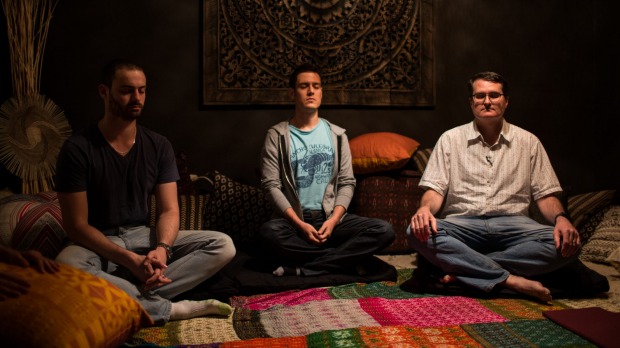Within the busy, multicoloured halls of Google’s Sydney headquarters is a small room dedicated to silence.
Cushions and the scent of essential oils fill the isolated space where technical program manager James Worsley retreats for 20 minutes every day.
“You would think taking 20 minutes to do nothing might slow you down, but it actually frees you up to get a lot more done,” he said.
Employers in corporations including Google are introducing workers to new ways of reducing stress through meditation, yoga classes, and colouring-in books. Some are even helping them make smoothies.
The stress-relief strategies are linked to what psychologists call “mindfulness”, a method of getting people to absorb the present moment and their physical surroundings.
Law firm Seyfarth Shaw has just opened a meditation room for its staff in Melbourne. In Sydney and Melbourne, its employees take part in “health and wellbeing” seminars that have included on-site massages, lessons in making smoothies and juices and seminars on nutrition and resilience.
Justine Turnbull, a partner at the firm, said the program has been well received. “It is about engagement and caring about our people who are sometimes required to work above and beyond,” she says.
Lendlease has also recently announced it will give staff an extra three days a year for “wellbeing leave” which can be used to attend a yoga retreat, a preventive health check-up or a meditation course.
Sydney recruitment company Precision Sourcing is among employers encouraging workers to grab a coloured pencil and colouring book for adults, instead of reaching for a cigarette or coffee to relieve stress.
Google’s Sydney office opened its meditation room in August in response to the lifestyle needs of its workers who had been using the library for meditation. Yoga classes are also conducted in the conference room.
“One of the philosophies we have is to hire smart people and get out of the way and let them organise their work and their life. There are things we can do to make that easier,” Google spokeswoman Annie Baxter says.
Numerous studies have shown that when done properly and consistently over at least eight weeks, mindfulness can retrain the mind and ultimately discourage feelings of stress and anxiety.
But academics including Professor Julie Cogin, of the University of NSW Business School, warn that it is not enough for workplaces to simply provide yoga classes or a meditation room while ignoring a more holistic approach to the workplace environment and culture.
Professor of work and health at the University of Sydney faculty of health sciences Philip Bohle said he had mixed feelings about mindfulness and stress-management approaches being adopted in the corporate sector.
“In lots of ways they are laudatory. I am sure they often enhance people’s lives and they also can be quite useful for coping with excessive demands at work, as long as those demands are short-lived bumps in workload,” Bohle says.
“It gives you a way to be more resilient and deal with the ups and downs at work. But I don’t think they are an adequate solution to workplaces where workloads are chronically excessive.”
Work intensification, downsizing and outsourcing are becoming more common, as is unpaid overtime.
“Just finding ways to make workers more resilient to cope better with stress and demands is like putting a Band-Aid on that,” Bohle says.
“Rather than just focusing on a worker’s resilience, which is a good thing, we need to have a look at the underlying organisational causes: excessive demands and stressful work.”
Zoe Krupka, a psychotherapist who teaches at the Cairnmillar Institute in Melbourne, says there is little doubt that the practice of mindfulness can produce significant health benefits.
But its current prominence in corporate culture is “nested within a social, cultural and political context where stress is now seen as a failure of the individual to adapt to the productivity demands of the corporation.
“In other words, if you’re stressed out, you’re not working hard enough on your personal focus strategy. You’re letting the team down,” she says.
An increasing part of her work as a therapist involves helping clients manage and “survive” the expectations of their workplace.
“It used to be people coming in to talk about relationships. That balance has really shifted. There is a significant increase in people seeing GPs and therapists about work stress,” she says.
And while the practice of meditation or yoga can be helpful, mindfulness should not be used to encourage compliance in a toxic workplace.
“If you are trying to meditate to manage the stress of a working environment that is untenable, it is not going to help you in the long term and is going to be harmful,” Krupka said.
“For the woman in the situation of domestic violence, mindfulness and yoga can be very helpful, but she still has to get out of danger.
“It is the fact that we are not identifying the dangers of overwork that I find concerning.”
Isabelle Phillips, a leadership consultant and researcher on mindfulness at the University of Technology Sydney business school, said 30 years of global research has supported the notion that eight weeks of mindfulness practice can change the physical structures of the brain.
“It increases wellness and decreases ill health in a myriad of ways,” she says. “There is little to be found that critiques mindfulness in the peer review literature”.
Sadhbh Joyce, a psychologist who works with the workplace mental health team at University of NSW and The Black Dog Institute, said mindfulness has proven to be effective if applied consistently.
“You need a certain amount of time for mindfulness skills to be taught,” she says. “Someone can do a mindfulness talk in the workplace and ticking a box doing something that is a step in the right direction. But if it’s not consistent, then it is going to fall flat on its face.”

